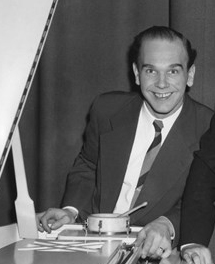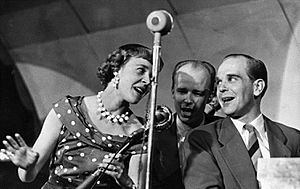Charlie Norman facts for kids
Quick facts for kids
Charlie Norman
|
|
|---|---|

Charlie Norman in 1954
|
|
| Background information | |
| Birth name | Karl-Erik Albert Norman |
| Born | 4 October 1920 Ludvika, Sweden |
| Died | 12 August 2005 (aged 84) Danderyd |
| Genres | Jazz, boogie-woogie |
| Occupation(s) | Musician |
| Instruments | Piano |
Charlie Norman, whose real name was Karl-Erik Albert Norman, was a famous Swedish musician and entertainer. He was born on October 4, 1920, and passed away on August 12, 2005. Charlie was known as Sweden's best boogie-woogie piano player in the 1940s. He was also a very talented all-around pianist.
He worked with many other artists, like the singer Alice Babs. Charlie also wrote music for movies and even acted in some films himself. His special boogie-woogie version of a classical song called "Anitra's Dance" by Edvard Grieg became very famous.
Contents
Early Life and First Steps in Music
Charlie Norman was born in Ludvika, a town in central Sweden. He became interested in music when he was very young. He played the trumpet in his school orchestra. At the same time, he was also learning to play the piano.
Charlie's parents wanted him to learn a "proper trade" before becoming a musician. So, he started working as a lathe operator at a company called ASEA. In his free time, he started his own dance orchestra. He played the piano in this orchestra.
In 1937, his dance orchestra entered a competition in Borlänge. Charlie's amazing piano skills were noticed. He was then invited to join the Sven Fors Orchestra.
Charlie got his first professional music job in the summer of 1937. He played with the Sven Fors Orchestra at a fancy restaurant in Varberg. He made his first appearance on the radio in 1938. After that, he worked with other famous orchestra leaders.
In 1942, Charlie got sick with tuberculosis. This is a serious lung disease. He had to stay in the hospital for a long time. While he was in the hospital, Charlie started writing music arrangements for recording sessions. He also created a course to teach others how to arrange music for dance orchestras.
In 1949, he married Dagny Knutsson. They had a son named Lennie and a daughter named Lena.
A Musical Career
By the early 1940s, Charlie Norman was already a very skilled boogie-woogie pianist. This style of music became his most popular type of composition. It also became his signature sound. His boogie-woogie style was a big hit when his first record, Charlies Boogie, came out in 1941.
In 1949, Charlie re-arranged Edvard Grieg's classical "Anitra's Dance." He renamed it "Anitra's Dance Boogie." This caused a big stir! The Grieg Foundation in Norway was very upset. They said his performance "broke Grieg's artistic copyright." Charlie's record company had to stop selling the remaining copies. But by then, the record had already sold over 10,000 copies. "Anitra's Dance Boogie" became one of the most requested songs in Charlie's shows.
During the 1940s, Charlie Norman performed in other countries. He made his television debut in Paris in 1947. He was on a show that also featured the famous singer Édith Piaf. In 1949, Charlie formed an orchestra to entertain US soldiers in Frankfurt.
Starting in 1950, Charlie reached even more people through his radio shows. He hosted radio series like The Night Owl and The Charlie Norman Show. In 1951, Charlie formed a trio with Rolf Berg and Hasse Burman. They toured and performed at many places.
Charlie made many recordings with the Swedish singer Alice Babs. One of these recordings became Sweden's first gold record. His work with Alice Babs was very successful and lasted for many years. In 1990, Charlie convinced her to perform again after she had retired for a long time.
Charlie was also part of a popular radio program called Today's Revue. He appeared with other famous entertainers like Sickan Carlsson. On television, Charlie worked on children's programs. He also contributed to a family program called Small Town.
He wrote music for many films, both short and full-length movies. Some of these films include The Pot Travel and Dangerous Freedom. He also wrote music for an American TV series called Foreign Intrigue.
Besides being a great pianist, Charlie Norman also had a wonderful sense of humor. People often compared him to the famous comedian and musician Victor Borge. Charlie wrote most of the funny material he used in his shows.
During the 1970s and 1980s, Charlie teamed up with his son, comedian Lennie Norman. They also worked with Ronnie Gardiner. For ten winter seasons, they entertained Swedish tourists in the Canary Islands. Charlie also performed in popular restaurants in Stockholm, Gothenburg, and Malmö. In the 1990s, Charlie often played with Robert Wells. Robert Wells was a big fan of Charlie's music.
Later Years and Passing
Charlie Norman passed away on August 12, 2005. He died in Danderyd, Sweden, from skeletal cancer.
Awards
- SKAP stipend, 1966
- Fred Winter stipend, 1993
- Lisebergsapplåden, 1997
- Grammis Honorary Award, 1997
- H. M. The King's Medal, 8th size with blue ribbon, 28 January 1998
His Music
Here are some of Charlie Norman's albums and recordings:
- 1941 – Charlies Boogie
- 1959 - Trudy (as "Charlie Norman Quartet")
- 1965 – Charlie Norman Show
- 1968 – Charlie Norman Show på Berns – Banne mej!
- 1970 – Charlie...
- 1973 – Garner och hemvävt
- 1975 – Charlie live
- 1976 – En glad X-Mas
- 1979 – The Boogie Woogie Touch
- 1980 – Charlie Norman går på party
- 1980 - Charlie Norman hyllar Fats Waller
- 1981 - Sophisticated Lady
- 1988 - Charlie Norman Trio
- 1991 - Charlie Norman Vs Robert Wells
- 1993 - Papa Piano
- 1998 - Swingtime Again
- 2001 – 1 timme, 12 minuter & 24 sekunder
- 2003 – En salig röra
On Screen
Charlie Norman was involved in these films:
Composer
- 1948 – Kvinnan gör mig galen
- 1950 – Kastrullresan
- 1952 – Han glömde henne aldrig
- 1952 – Oppåt med gröna hissen
- 1952 – Farlig kurva
- 1952 – Sabotage
- 1953 – Arbetets melodi
- 1954 – Farlig frihet
- 1955 – Danssalongen
- 1956 – Foreign Intrigue
- 1957 – Som man bäddar...
Actor
- 1941 – Söderpojkar
- 1941 – Gatans serenad
- 1941 – Bara en kvinna
- 1949 – Kvinnan som försvann
- 1950 – Toner från Texas
- 1952 – Skivscheiken Nr 1
- 1952 – Drömsemester
- 1953 – Skivscheiken Nr 2
- 1953 – Kungen av Dalarna
- 1953 – Arbetets melodi
- 1954 – 1900 - till idag
- 1955 – Släck av!
- 1956 – Johan på Snippen
- 1964 – Tre dar på luffen
 | James B. Knighten |
 | Azellia White |
 | Willa Brown |


